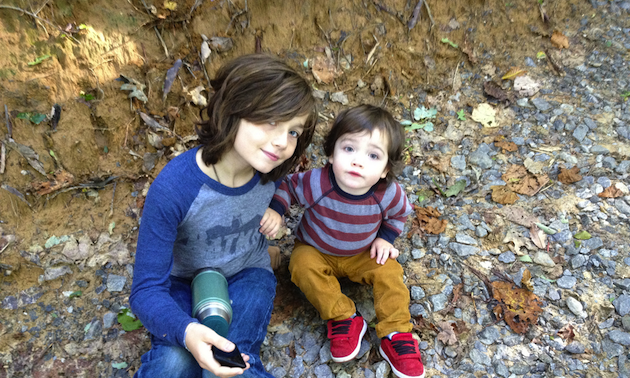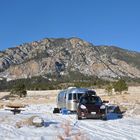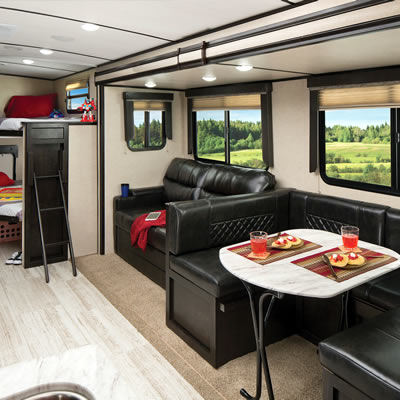Full-timing it, family style
On the road with three children

When I first began roadtripping, back in the days when I'd save up my three weeks of vacation for one long go around the country or jaunt to Europe, travelling was something altogether different from what it has become now. Back then, accommodations meant the back of a car or a tent or maybe a $15 sleazy hotel room. This is not the stuff of most people's vacation dreams, but for me, it was about making do with as little as possible in order to see as much as I could.
Father Time kept showing up regularly every year, and by the time I'd made the commitment to go full-time, living in an RV with my family and travelling the world, I was no longer a self-assumed rugged individualist but the primary caretaker of my oldest son, Tristan. He was eight, we lived in a 28-foot RV, and times were good. That was in 2008, and since then my family has doubled in size, not including the dog.
While family travel is certainly a whole other ride than what solo travelers or couples with no children experience, I'm here to tell you, flat out, blatant and simply: it's still a dream. Granted, one wrought with diapers, disorganized cupboards and not quite as many late nights at the bar, but a dream nonetheless.
The harsh realities
I won't say it's all babies coming home with handfuls of daisies and nights around the fire cooking s'mores. Though it often is. Raising children on the road means both parents spending nearly the entirety of their days with the young ones. It's making sure your excursions filter in returns to your RV for naps. It's knowing that you'll need to find restaurants, concerts and the other activities along your route which are kid-friendly.
It is not a life for those who believe that children should be seen and not heard; but rather, the existence of the roving family is centered around coming together, experiencing the wide open world with your arms splayed open and your children's eyes beaming with all of the experiences no single hometown could ever provide. It's about learning together. As children, they're getting an education with nearly every breath, gaining an intimacy with the differences this world has to offer with each new step. As parents, it's about learning to be a teacher, not just a rule-maker, about growing as a person even as you're helping others to bloom into whomever they'll one day be.
The highlights, then?
To write an entire book might be the proper endeavor for such an undertaking as describing the joys of raising young ones on the road. Long story short, though, I am not a particularly extroverted person, nor is my baby's mama. Our children are an entirely different story altogether. My oldest son, Tristan David, has been travelling since birth, full-timing it since he was seven. He has learned how to make friends as quickly as it takes me to fill a gas tank. Now 11, he bursts from the doors of our home on the road and finds the nearest playground in an RV park or gathering of children in a state park and mingles like chocolate syrup into a glass of milk. He's learned to identify the signs of rejectiona nd how to play dodgeball with such attempts. His own heart and attitude have grown toward acceptance. He sees no race, very little age, and gender is completely useless to his pursuits. Coming originally from a predominantly white hometown, without this travelling he never would have had the immersion into the largely Latino and Native American crowds of children he's come to know as friends as we travel the deserts every winter. Whether a child is five or 15, if they're willing to play with him, there are no monkey bars, frisbees or games of tag that won't admit the variety of ages. Little girls willing to stomp in the mud are as welcome as a group of older boys. It's a tale of rounding out, becoming more than just a human, but instead becoming part of all of humanity.
Our middle child, Winter Erik, at less than two years old has had the opportunity to see the foliage of New England, the banks of the Great Lakes, the rainforests of Oregon's coast, the downtowns of countless big cities across the land. In these initial years when he's first forming his personality, he's had the fortune to watch elks in rut, feel pine cones with his own hands and dig in the desert sand. His stimulation is varied, and his personality will no doubt benefit from that just as his older brother has and his baby brother, Wylder Reisen, will as well.
Tips, tricks and talents
We've discovered quite a few ways of navigating the sometimes rocky waters that are travelling with youth.
Naps are essential, for both the kids as well as the adults. We wake up early, adventure our hearts out, and then take some downtime in the afternoon regularly, if not always on a specific schedule, to make certain everyone has a chance to recharge their batteries. It may seem desirable to do it all, see it all as quickly as possible, but I'd rather listen to the sound of children laughing alongside the banks of a creek than accompany them screaming down the wide flow of the Mississippi.
Entertainment is key, particularly on longer stints down the highway. We do try and keep our travelling times down to one or two hours at a pop, but that is a very long time even for seasoned travelling children, particularly toddlers. We keep a few episodes of Fraggle Rock, a copy of The Labyrinth and some short Sesame Street songs on an iPad so that the kids can have something to keep their minds occupied. No matter how gorgeous it may be driving from Yellowstone to the Tetons, children are simply not interested in looking out the window at mountains all day. Give in to their desires during these "down times" and you'll be rewarded for it all the more when they're refreshed and ready to run full force into the next adventure.
Simplicity is beautiful. We carry backpacks, not duffle bags. Each child has a small box that they can keep a few toys in, which helps keep them both interested in the little they have (too many options typically equals disinterest in any of them) but also drives their desire to get out of the RV and explore all this nature around them. Learn to carry your children on your back, limit what you bring along on excursions, and things will be much smoother.
Shifts become essential, as regardless of how much you love your children, we all need a break, daily even. We do most things together in this life, but as parents we also take time off every day. I have a beer while starting a fire every night, no children allowed until the flames are glowing high. I take them all on hikes in the early mornings, giving mom a break, some time to put her feet up and read a little. Even if these moments are short, knowing that there is always another one around the corner makes the pressures of parenting a bit less heavy.
Happy hour
Once every day or so, after a solid afternoon outing, we typically find a sunny cafe porch that looks kid-friendly and all sit down together, the tykes for a snack, us for a drink. We'll sip on a beer and talk about what we've done, what we'd like to do, and the kids can color with crayons or play with Matchbox cars while they ingest whatever local fare is available.
Personal space is as important when you're living in an RV as it is at a home. Our kids are exceptional with sharing, but they still need to have some amount of space that is theirs, a place they know will be left to their own devices, their own belongings. This keeps child one from complaining that child two stole his whatchamacallit, but also makes the job of parents easier: you keep your stuff in your zone or it's gone, calming tensions between young ones while at the same time teaching your kids that you're not their personal maid service.
Take it slow
Rookie travellers typically want to see the world before the next full moon. Understandable, as when you begin this lifestyle it can seem too good to be true and you want to get it all in before it comes crashing down. But as you realize that you can make it work for as long as you'd like, the idea of going more slowly, taking your time to really get to know a place, becomes more appealing. This provides the benefit of getting to know a culture, the local people, maybe make a few friends, discover a few secrets not on the tourism brochures. For children, it means less time in the car, more stability as they are given a chance to get their bearings before being whisked off again. But most importantly, having a mindset of "we can get to that tomorrow" will keep you from trying to rush through everything, ignoring the other tips above, and ending up with cranky kids at the bottom of some grand canyon. It is quite literally the difference between enjoying this whole thing and wishing it would all just be over.
Visit relatives
Location-dependent families typically have a support network: grandparents, aunts, friends to rely on. Since this is less likely when you hit the road, engineer your route to include a trip back to your parents’ house or some other relatives every now and then. They'll revel in the opportunity to see their progeny, and you'll get some time for just you, to be a kid again yourself if you will.
The most important thing is your attitude. If you got into travel because you wanted more time with your family, you will receive that in abundance. Remember that stick house families have moments where they want to pull their hair out, too, and so you're not experiencing anything unusual, you're just getting to experience it all with the added benefit of seeing the world in between breakdowns and diaper changes.
Nathan Swartz has been travelling for 12 years, eight of those with small children. He is currently running a Kickstarter campaign to help fund his family's online travel mag, Wand'rly Magazine. Discover how the U.S. highway system works, the behind-the-scenes lives of buskers and travelling bands, and the least-known, most-interesting places to explore in the U.S.








